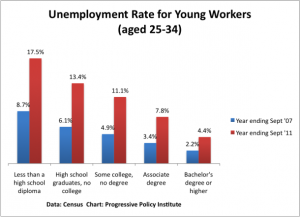As a university student I often wonder: is it worth it to go to university? While high school students who decide to join the work force instead of attending a post secondary education are generating income, university students are spending a significant amount o f money for an education. According to the Financial Post, tuition cost in canada averages to $5,266 a year and average student will incur approximately $2,7000 dollars in student debt. Despite the obvious short term financial disadvantage, however, researches have been shown that a post secondary degree is a sound investment in the long run. This is affirmed by Iglika Ivanova, an economist at the Canadian Centre for Policy Alternatives, who states that the premium for a bachelor degree is 40 percents for male workers and 51 percent for female worker. Furthermore, it can be argued that a college degree increase employment security as the unemployment of college graduates are much lower compare to the US national average, 3.9 percent, and 7.5 percent respectively. Moreover, since predictions suggest that over 35% of new jobs in the coming decade will require a post-secondary degree, it is fair to assume that a bachelor degree will strengthen job prospects.
f money for an education. According to the Financial Post, tuition cost in canada averages to $5,266 a year and average student will incur approximately $2,7000 dollars in student debt. Despite the obvious short term financial disadvantage, however, researches have been shown that a post secondary degree is a sound investment in the long run. This is affirmed by Iglika Ivanova, an economist at the Canadian Centre for Policy Alternatives, who states that the premium for a bachelor degree is 40 percents for male workers and 51 percent for female worker. Furthermore, it can be argued that a college degree increase employment security as the unemployment of college graduates are much lower compare to the US national average, 3.9 percent, and 7.5 percent respectively. Moreover, since predictions suggest that over 35% of new jobs in the coming decade will require a post-secondary degree, it is fair to assume that a bachelor degree will strengthen job prospects.
References:
http://business.financialpost.com/2012/02/27/post-secondary-worth-the-price/
Reference for picture:
http://innovationandgrowth.files.wordpress.com/2011/11/unemployment.png


